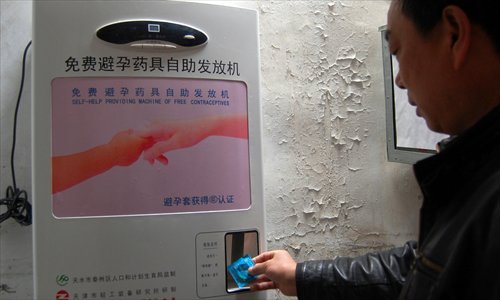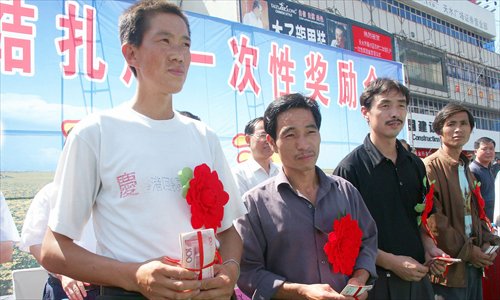HOME >> CHINA
Born equal
By Oriental Outlook – Global Times Source:Global Times Published: 2014-9-11 19:58:01
Newly relaxed family planning policy challenges gender roles in contraception

A man takes a free condom from a dispenser in Tianshui, Gansu Province. Photo:CFP

Men in Tianshui are recognized by their local government for undergoing No-Scalpel Vasectomy surgery. Photo: CFP
For a populous country like China, family planning is a fundamental State policy. Contraception in the Chinese mainland is not just a choice among couples to prevent unplanned pregnancies, but part of a nationwide family planning policy.
For decades, the policy strictly stipulated families can only have one child unless they lived in rural areas and their first child is a girl. However since March 2014, many regions relaxed restrictions, allowing couples to have two children if either parent is an only child.
For many families, contraception is key, as a policy violation can result in fines or even loss of employment.
But such responsibilities seem to have fallen on the shoulders of women, as 85 percent of all forms of contraceptives used in 2012 were designed for females, according to statistics by the National Health and Family Planning Commission.
Some attribute this trend to the advanced development of female contraceptive devices, while others believe the divide reflects gender discrimination in Chinese society.
Unbalanced numbers
Male sterilization in China has dropped to 5.5 percent, a record-low despite the country pioneering the world's most advanced vasectomy procedure, which is cheaper, safer and simpler than female ones, according to a 2013 report by the National Health and Family Planning Commission.
Meanwhile, intra-uterine devices accounted for 53.7 percent of all contraceptive methods used in China in 2012, said the report.
According to a research conducted by the US-based Johns Hopkins Bloomberg School of Public Health, other factors should be taken into consideration when a single method accounts for over half of all contraceptive methods, while many Chinese experts argued the popularity of intra-uterine devices cannot be explained by simply stating that Chinese women like it.
"Vasectomies are a better choice if the both partners are comfortable with the procedures," Liu Xiaozhang, a professor with the Chengdu University of Traditional Chinese Medicine, said.
According to Liu, vasectomies are the only internationally recognized form of birth control. No-Scalpel Vasectomy, invented in 1976 by Chongqing-based andrology expert Li Shunqiang, boasts a lower chance for complications, less pain and a faster recovery than the conventional vasectomy.
Vasectomies are also more effective with a failure rate of 0.1 percent, compared to 0.5 percent for tubal ligation, which also carries the risk of extra-uterine pregnancy.
China's family planning policy was first listed in the Constitution in 1978.
According to the Constitution, both husband and wife are jointly responsible for practicing birth control.
Before official family planning efforts were introduced, a lot of men voluntarily went through vasectomies after having four or five children. After birth control became compulsory, there was a burst of demand for surgeries. Quality, however, plummeted, leaving male sterilization with a decreased reputation.
Perceived gender roles in Chinese society is the main reason for men to dodge contraceptive responsibility, Wang Xiangxian, a sociology professor with the Tianjin Normal University opined in an article. "Sexual power has always been a core part of the male identity. Male sterilization has been mistaken as an emasculation that will make men less of a man."
Vasectomy rates have dropped to less than 2 percent among male populations in Asian countries such as India, Bangladesh, and the Philippines, according to the United Nations Population Division.
Call for equality
"Gender equality should be promoted in birth control," said Wang.
The National Health and Family Planning Commission argued that the female physiology is more suited for contraceptive methods, and the majority of recent medical advances have focused on female contraceptive methods.
But Wang's research shows that male sterilization is the main form of birth control used in the western countries, such as the US, the UK, Canada, Australia and New Zealand since its emergence in the 1960s.
Insufficient knowledge of birth control is also an issue as China witnesses an increasing prevalence of pre-marital sex and a younger sexually active population.
According to a research done by China Population Communication Center and the School of Sociology and Population Studies of the Renmin University of China in 2013, 69 percent of all teenagers have had unprotected sex, while 75 percent of them had resorted to birth control methods such as emergency contraception and external ejaculation.
This lack of awareness has left women less protected, as only 23 percent of those who participated in the study claimed to know the risks of emergency contraception, while 81 percent said they had used the method.
Another risk is unexpected pregnancy. Around 65 percent of women who underwent an abortion were unmarried and aged 20 to 29, while 63 percent of them had their first abortion under the age of 19.
Promising signs
Awareness of gender equality in birth control is increasing. According to a 2011 poll done by Wang and his colleagues in Southern China, 79 percent of the adult men believe birth control is a shared responsibility.
Government statistics also show that the use of condoms has increased by 228.6 percent between 2002 and 2012, while the use of birth control pills has dropped 54 percent.
The future of birth control in China depends on the development of medical technology and on individual choice, said a National Health and Family Planning Commission official.
"As more married couples seek to avoid pregnancy, the use of short-term measures such as condoms, contraceptive pills and intra-uterine devices will rise," said the official.
"Birth control should be based on informed and voluntary decisions based in gender equality," said Wang.
Posted in: Society